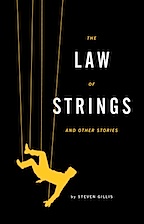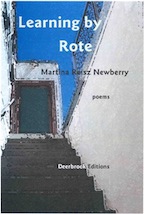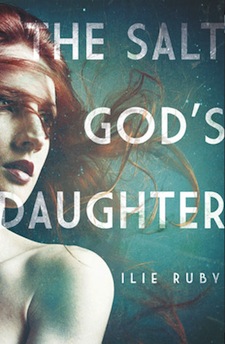
Book Reviews: September 2012
Maverick Jetpants in the City of Quality, Fiction by Bill Peters
Meat Heart, Poetry by Melissa Broder
The Law of Strings and Other Stories, Short Stories by Steven Gillis
Confessions of a Plagiarist and Other Tales from School, Nonfiction Nonfiction by Kevin Kopelson
Learning by Rote, Poetry by Martina Reisz Newberry
The Salt God’s Daughter, Fiction by Ilie Ruby
Stray Decorum, Short Stories by George Singleton
fff
 Maverick Jetpants in the City of Quality
Maverick Jetpants in the City of Quality
Fiction by Bill Peters
Black Balloon Publishing, October 2012
ISBN-13: 978-1936787029
$14.00, 290pp.
Reviewed by Joe Ponepinto
They’re in a New York state of angst.
On the fringes of every society, excluded from the core group that makes the money and the rules, exist the outsiders. These are people who, whether by race or class or education, believe they’ll never belong to the mainstream, will never have the chance to prove themselves equal to the haves. And so they invent a Bizarro parallel universe, one in which the rules and mores and even the language of that other world don’t apply.
For Nate, Necro, Toby, and Lip Cheese, the economic wasteland of 1999 Rochester—the former Kodak City of Quality—serves as backdrop for their slacker antics. Nate tells the story of Classic Rochester Drivearounds in Necro’s Vomit Cruiser, as they go in search of a possible Tokyo Rocking Horse, or maybe the next Weapons of Mankind convention. But their sequestered world is threatened when someone starts bombing Rochester’s downtown, and suspicions cause the boys to question their lives, and each other. The twenty-somethings struggle to remain friends while maintaining a barrage of code phrases originally designed to separate them from the establishment, as well as offer a semblance of pride amid their apparently hopeless circumstances. Colonel Hellstache be damned. It’s a Sadness Custard Montage if there ever was one. Will they ever go back to Maverick Jetpantsing?
The language makes it a tough narrative to follow at times, but the challenge is well worth it. Peters and his editors at Black Balloon deserve Holy Grail Points for refusing to cave to popular pressures to explain every little thing to the reader, including the secret vernacular. (A few bonus points too, for what has to be the best book title in years.) This is Peters’s world—he grew up in Rochester—and entry is on his terms. The only way to really experience the desperation of these lives—especially Nate’s—is to live them, and Peters drops visitors in headfirst. Some may sink amid the language and irreverence. Those who swim, however, will emerge refreshed by one of the most inventive novels published this year.
 Meat Heart
Meat Heart
Poetry by Melissa Broder
Publishing Genius, 2012
ISBN-13: 978-0983170662
$13.95, 88pp.
Reviewed by Michael Martin Shea
Meat Heart, Melissa Broder’s second book, picks up right where her first left off. Building on the tongue-in-cheek humor of When You Say One Thing But Mean Your Mother, but pushing it further toward absurdity, Broder’s new collection spins issues of God, loneliness, and flesh through her distinct voice, giving us poems whose comic irreverence only partially mask the deeper issues at heart. And where Mother at times felt satisfied with its own cleverness, Meat Heart is driven by a deep sense of both excitement and fear. Above all, the book has an obsession with the carnality of the body, and while it opens on a lighter note, with Broder declaring that “there is only Slim Jim love / and taco glow,” the closing poem strikes at the heart of the issue:
but it would be a lie
if I said that the heart
is not made out of meat
a fat and fatal core
The last line of the collection finds Broder at her most vulnerable: “I do not know why / we cannot // make the whole / story up.” Yet flying in the face of this is the collection itself: seen as an attempt to reject the physicality of existence, to mock or subvert it, Meat Heart becomes a means of escape, even if only temporary. If we can ridicule the idea of the body, perhaps we can avoid the hold it has on us. Likewise, the speaker’s iconoclastic engagement with God, who “keeps unfurling [the speaker] / with god’s gigantic helium,” uses downright absurdity to both mask and highlight the incessant need for communion with another world.
Broder’s foremost talent is her ability to write lines that are as arresting as they are funny, and standout examples here include, “I found the Summer of Love in a trash can at Hardee’s & I ate it” or “She shook her parcel of babies.” Meat Heart is a book that will make you laugh quietly to yourself in public, though you’ll be too ashamed to explain why. In fact, the less-fulfilling poems in the collection are the ones that trade line for concept, a bit of a holdover from Mother. Broder’s touch for the macro is not as refined, and when her poems focus their efforts on the cohesive idea rather than the language, it feels like something’s missing. Nonetheless, between God as an “old stuffed potato” and confessions that “monthly I must snort the universe,” there’s more than enough here to keep you startled, and the leap forward from her debut gives us good reason to hope for more.
 The Law of Strings And Other Stories
The Law of Strings And Other Stories
Short Stories by Steven Gillis
Atticus Books, 2012
ISBN-13: 978-0983208082
$14.95, 182pp.
Reviewed by Nicolle Elizabeth and Joe Ponepinto
The world, as we know, does not relent. Its stresses and tangents pull us ever farther from our centers, defying us to maintain who and what we are, forcing compromises we could not have imagined. Steven Gillis’s latest collection, The Law of Strings, examines how and why, despite our best attempts to be guided by our brains, it is our hearts that rule.
“Falling,” for example, is told from the perspective of an extreme sports star, what once was called a daredevil, who is preparing for a high wire walk between two peaks 1200 feet above a canyon. Despite the impending danger and the intricate preparations he must make to ensure safety and success, his primary concern is the state of his relationship—he cannot fight the fact he has fallen in love with his girlfriend, to the detriment of his sport—and the tone is reflective and tender, rather than the rad jock-speak one hears from X-Gamers.
Gillis’s is an intellectual voice. The thought and research he lavishes on his stories ooze from the text, giving his work a Richard Powers-like fascination with the nuances of science and technology. His description of an archer’s gear talks of thermal grips and press-fit tunable nocks; a report about a record geological drilling yields a “lubricated shaft, the pressurized bit buzzing through rock and sand, iridium and basalt, coesite and fossil. Scientists hoped to reach the Mohorovicic discontinuity, where the Earth’s crust and mantle met approximately nine miles down…” He is unafraid even to dabble in the theoretical realm of quantum physics.
But these are primarily relationship stories—Gillis’s intellectualism is tempered with the realities of modern love, creating a technique not encountered nearly enough in modern fiction’s current minimalism, where intricate emotion is often reduced to childlike impulse, and causality translated into chance. Instead, the Michigan writer and co-publisher at Dzanc Books lets his characters manifest the complexities of society as simple, yet fantastical metaphor. In “The Society for the Protection of Animals,” Uniss confines herself to a cage in her and the narrator’s apartment, to truly understand what it’s like for laboratory dogs prior to experimentation. Similarly, in the title story, protagonist Lange is a doctoral student in Physics whose live-in girlfriend, Eva, applies M-theory to their relationship by binding herself with a variety of strings, rope, and chains in an effort to reconcile what can be seen with what can’t.
The stories in The Law of Strings resonate with the way we live—the educated among us, at least—revealing the careful balance we must maintain between our rational and emotional desires. In his deep and thoughtful style, Gillis allows us to learn something about both.
 Confessions of a Plagiarist and Other Tales from School
Confessions of a Plagiarist and Other Tales from School
Nonfiction by Kevin Kopelson
Counterpath Press, April 2012
ISBN: 978-1933996301
$17.95, 224pp.
Reviewed by Lori A. May
Part self-deprecation, and part soap-box pride, Kevin Kopelson takes the launching pad success of his essay “My Cortez” (originally published in 2008 by the London Review of Books) and chronicles—examines—his knack for quoting, and indeed borrowing from, others. Naysayers, beware. Any presumption that an author who readily confesses to repeated borrowing—er, plagiarism—is likely to provide a sloppy tale of redemption will be thrown off balance upon cracking this spine.
Kopelson has a firm grasp on not just language, but on delivering a literary argument so tight, so intelligent, one will up the curiosity factor of why an obviously talented, obviously skilled writer would bother looking to others, rather than his own words. Yet herein lays the paradox: Kopelson has honed his skills by emulating others and indeed by modeling his thoughts from all he has learned from masters. Is this not what instructors of literature and critical theory encourage us to do? Kopelson thinks so and admits to doing exactly that as a teacher himself.
In Confessions, Kopelson argues not to defend his incessant quoting and referencing of others, but to defend the necessity of finding one’s way through self-made, emulated, and mirrored expression. This mentality transfers to every facet of the author’s life; Confessions is more than literary theory, it is an examination of the author’s life experiences. From his academic journey to sperm donation, from stress and weight loss to relationships found and lost, Kopelson takes us on unexpected paths, yet consistently delivers a resounding defense of expression and critical thought.
Even in personal tangents and abstracts, Kopelson finds a way to quote extensively, to look to others, and use their words to express himself. In “Kiss and Tell,” the author takes us on a journey of sexuality and promiscuity, but not without calling upon The Oxford English Dictionary to define and then debate what most of us would likely gloss over. Yet Kopelson keeps us there, debating what promiscuity is and means, perhaps to him, perhaps to us all. In “Veritas,” Kopelson turns to the subject of sabbatical and the tension between writing (constructing something) and teaching (deconstructing something)—and then seamlessly leads us to ballet, pyromania, and relational closure.
Littered with observations, quotations, and abundant confession, Kopelson’s book provides a relentless and unexpected exploration of what it is to think freely, express clearly, and come to one’s being through absorbing, modeling, and at times plagiarizing others. In as much as it is a chronicling of a man’s progress from schoolboy to school teacher, it is more so a reflection on how a person grows into himself and his convictions.
 Learning by Rote
Learning by Rote
Poetry by Martina Reisz Newberry
Deerbrook Editions, 2012
ISBN-13: 978-0982810026
$16.95, 98pp.
Reviewed by Ed Bennett
Martina Reisz Newberry’s latest collection of poems, Learning by Rote, examines the shape of love, ageing, and coping with the left-handed curveballs that life sometimes throws at us in sixty well-crafted poems. The author is skilled in the use of poetic forms from ghazal to pantoum to tanka. The overall effect is one that makes the reader look deeper into those things we take for granted.
Throughout the work she surprises by her insights. Even the title may not be what it seems. We know that one learns by “rote,” through memorization. But the introductory page presents a more complete definition of the word. Aside from memorization, rote can be a cry or roar or the beating of surf on a beach. It can be a medieval instrument akin to a lute. Newberry implies that we learn by memorization, but also by the pain of our existence. The reference to a medieval lute conjures the image of the ancient bards singing of love and life, much as Newberry does throughout the book.
Her imagery is both blatant and symbolic (as a good image should be), and she adds her own observations for the reader to ponder. In “Above Us on the Hill” she tells us:
…We don’t grow in
Time. We unroll ourselves like children hiding
in rolled carpet, then prod down a hill, our
selves unrolling by inches and standing in
vertigo-ridden wonder at the foot of
that hill
Newberry looks at how many of us simply exist and allow love or loneliness or depression to wash passively over us. She exhorts us to live, not simply exist, by showing the small beauties in that which we take for granted.
 The Salt God’s Daughter
The Salt God’s Daughter
Fiction by Ilie Ruby
Soft Skull Press, September 2012
ISBN-13: 978-1619020023
$14.95, 352pp.
Reviewed by Kristen Leigh
Ilie Ruby’s latest novel, The Salt God’s Daughter, breathes to life the etymological definition of “nostalgia”: Gk., “nostos” meaning a return home and “algos” meaning pain, suffering. Fleshing out this sensibility with hints of magical realism, Native American folklore, and totem animals, the structure of the work mimics the natural rhythms of moon phases and oceanic tides to provide the narrative’s unique shape. Set in early 1970s Southern California, Ruby crafts a portrait of a transient family’s struggles over the course of three generations. Readers are introduced to Ruth, her mother Diana, and finally to Ruth’s daughter Naida. This listing from one perspective to another creates a deep and moving chronicle of single mothers raising and sometimes abandoning their daughters. The heartbreak is forgivable because Ruby is an expert at reminding readers that a well-written work of literary fiction imitates how life continues and allows us to change long after the most volatile betrayal or the greatest joy is experienced.
Ruth voices the greater part of the narrative. This is a wise choice Ruby makes, for we quickly learn of Diana’s instability through her impetuous responses to common obstacles—defiant daughters, men, a come-hither pout too frequently whet with whiskey—in short, the first hand account of manipulation and great loss which are trademarks of an unreliable narrator. This story needs reliability, as the main characters shuffle from one town to another in search of food, work, and romance. It is charged with emotional violence and a depth of loss, unapologetically the framework of a great redemption. Ruth becomes the narrator readers are able to believe implicitly as she navigates through the turbulent waters of childhood to become a woman who learns to provide the stability she had been craving throughout her early life for her own daughter. This passage from Ruth’s early adulthood summarizes the struggles Ruby develops throughout the book: “We wanted to be not like some girls. We wanted to be like all girls, all those who would come after us, and all of those who had come before. We wanted the questions asked by women generation after generation. We wanted to hold the labels in our hands, to turn them around, to take them apart.” This enjoyable read stays true to this objective throughout, bringing unforgettable characters to readers through circumstances that are believable, yet nestled in the cultural traditions and superstitions we sometimes need to guide us through difficult times.
 Stray Decorum
Stray Decorum
Short Stories by George Singleton
Dzanc Books, 2012
ISBN-13: 978-1938103544
$15.95, 173pp.
Reviewed by Joe Ponepinto
The people of George Singleton’s rural South Carolina don’t spend much time arguing politics or religion or any of the dozens of subjects with which most of the rest of us occupy ourselves. They know what’s truly important—privacy (for starters), the right to be as big a fool as you want sometimes, Schlitz beer (when you can get it, otherwise Pabst Blue Ribbon), and maybe most of all, taking care of strays. If a dog is all you can count on, and occasionally the only one you can relate to, then there’s no reason to ever mistreat one, and Singleton’s characters—a grab bag of the down and out—never do. People, though, that’s another matter.
There’s a stray dog in every one of these stories, playing roles from co-star to walk on, one of several threads that tie these pieces together. Some of the characters have recurring roles, although this is not a novel in stories, which gives the collection a bit of a Lake Wobegon feel—Singleton weaving the lives of his make-believe neighbors into quirky tales of life in the sticks. To build a moat around his house (to keep the vermin out, of course), Stet’s father convinces the Ethiopian immigrant teacher at his son’s school that rubies and sapphires lay just underground, and has the schoolkids do the digging for him. Alex Mull shows up at the Doffers Paradise Lounge looking for a bear suit—just the thing to disrupt his ex-girlfriend’s wedding. Meanwhile, Billy Crume, whose father invented the “Hole-in-the-Head” device to keep shampoo out of kids’ eyes, is looking to sell “If I Were U” T-shirts, as in “If I Were U, Then Pissy Would Be Pussy.”
Readers may be tempted to find a touch of John Cheever’s Shady Hill stories here too. The author knows his stomping grounds so well, the people and the places practically describe themselves, leaving him free to use action to plumb the philosophical depths found at the bottom of even the simplest acts. But even if one reads these stories purely for entertainment, the result is a similar satisfaction. These tales are often funny, and never disappointing—not a runt in the litter.
